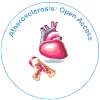Unsere Gruppe organisiert über 3000 globale Konferenzreihen Jährliche Veranstaltungen in den USA, Europa und anderen Ländern. Asien mit Unterstützung von 1000 weiteren wissenschaftlichen Gesellschaften und veröffentlicht über 700 Open Access Zeitschriften, die über 50.000 bedeutende Persönlichkeiten und renommierte Wissenschaftler als Redaktionsmitglieder enthalten.
Open-Access-Zeitschriften gewinnen mehr Leser und Zitierungen
700 Zeitschriften und 15.000.000 Leser Jede Zeitschrift erhält mehr als 25.000 Leser
Indiziert in
- Google Scholar
- RefSeek
- Hamdard-Universität
- EBSCO AZ
- Publons
- ICMJE
Nützliche Links
Open-Access-Zeitschriften
Teile diese Seite
Abstrakt
Inflammation and Immunological Responses in Atherosclerosis: Origins and Therapeutic Targets for Innovative Cardiovascular Disease (CVD) Therapies
Glory Coppe
This study focuses on atherosclerosis, a prominent cause of cardiovascular disease (CVD). Atherosclerosis is a chronic inflammatory disorder characterised by immunological competent cells in lesions that primarily generate proinflammatory cytokines. The presence of dead cells and oxidised versions of low density lipoproteins (oxLDL) is significant in this syndrome. The rupture of atherosclerotic plaques is the main cause of CVD. At larger concentrations, oxLDL has features that promote inflammation and immunological activation, causing cell death. It also includes inflammatory phospholipids, notably phosphorylcholine (PC), which is an intriguing epitope. Antibodies that target PC (anti-PC) may have atheroprotective benefits, possibly due to their anti-inflammatory qualities. While the participation of bacteria and viruses in atherosclerosis has been discussed, direct proof has been difficult to come by, and antibiotic studies have failed. Heat shock proteins have the potential to be targets for atherogenic immune responses. Pro-inflammatory cytokines, chemokines, and lipid mediators are other contributors in plaque rupture. To establish inflammation as a cause of atherosclerosis and CVD, clinical trials using anti-inflammatory and immune-modulatory therapy are required. This review investigates the possible origins of immunological responses and inflammation in atherosclerosis, as well as therapeutic techniques that target inflammation for innovative CVD therapies.
Zeitschriften nach Themen
- Allgemeine Wissenschaft
- Biochemie
- Chemie
- Genetik und Molekularbiologie
- Geologie und Geowissenschaften
- Immunologie und Mikrobiologie
- Klinische Wissenschaften
- Krankenpflege und Gesundheitsfürsorge
- Landwirtschaft und Aquakultur
- Lebensmittel & Ernährung
- Maschinenbau
- Materialwissenschaften
- Medizinische Wissenschaften
- Pharmazeutische Wissenschaften
- Physik
- Sozial- und Politikwissenschaften
- Umweltwissenschaften
- Veterinärwissenschaften
Klinische und medizinische Fachzeitschriften
- Anästhesiologie
- Augenheilkunde
- Betrieb
- Dermatologie
- Diabetes und Endokrinologie
- Gastroenterologie
- Genetik
- Gesundheitspflege
- Immunologie
- Infektionskrankheiten
- Kardiologie
- Klinische Forschung
- Medizin
- Mikrobiologie
- Molekularbiologie
- Neurologie
- Onkologie
- Pädiatrie
- Pathologie
- Pflege
- Toxikologie
- Zahnheilkunde

 English
English  Spanish
Spanish  Chinese
Chinese  Russian
Russian  French
French  Japanese
Japanese  Portuguese
Portuguese  Hindi
Hindi